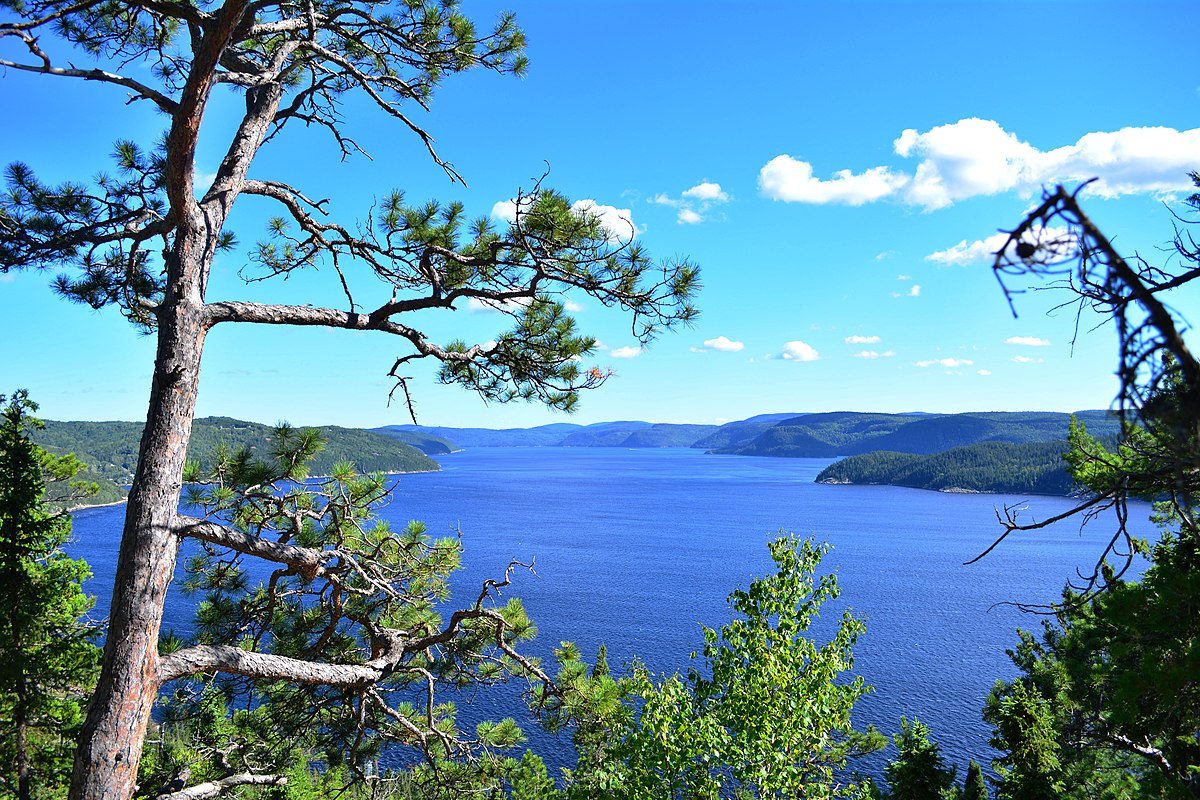An American company wanted to build a massive fossil fuel project in Quebec. After full public debate, the provincial and federal governments rejected the plan based on environmental concerns. The company launched a record-breaking NAFTA lawsuit against Canada — confirming the dire threat that investor-state dispute settlement (ISDS) poses to bold climate action.
The case — the largest in NAFTA’s history — drives home the growing conflict between forward-looking, ambitious climate action and retrograde investment treaties that indemnify foreign investors from government decisions that cut into their future profits.
Ruby River Capital, a Delaware-registered corporation owned and controlled by two U.S. venture capital firms, proposed to build a natural gas liquefaction plant and maritime terminal on the Saguenay Fjord near the mouth of the St. Lawrence River.
The Énergie Saguenay project included plans for related infrastructure needed to store gas, load tankers and ship liquefied natural gas (LNG) to overseas markets.
In July 2021, the Quebec government rejected the LNG proposal based on the results of a two-year public environmental impact assessment. The assessment found that Énergie Saguenay would significantly increase greenhouse gas emissions and negatively affect First Nations in the area and marine mammals. A separate federal environmental assessment flagged similar concerns, leading Canada’s environment minister to deny approval to the Ruby River venture.
Without these necessary provincial and federal approvals, the project is effectively dead. However, in February, Ruby River filed a last-minute NAFTA investor-state lawsuit challenging Canada under the investment chapter of the Canada-U.S.-Mexico Agreement (CUSMA). Last-minute because the so-called legacy rights allowing investors to bring ISDS claims under the old NAFTA rules expired on July 1.
In its request for NAFTA arbitration, Ruby River objects to what it calls the “fundamentally arbitrary, procedurally grossly unjust, expropriatory, and discriminatory treatment” its proposal received at the hands of the Quebec and Canadian governments.
The firm is seeking compensation of “no less than” US$20 billion (just over $27 billion Canadian) — the largest amount ever claimed by an investor under NAFTA’s ISDS provisions and among the highest current investor-state claims globally.
Ruby River’s inflated demands are based on the investor’s speculative estimate of the profits the project supposedly would have made over its lifetime. It is many, many times the costs actually incurred in seeking project approval (US$120 million by the investor’s estimate).
If Ruby River could win even a significant fraction of what it is demanding, it could make the investor-state litigation a more profitable venture than proceeding with the Énergie Saguenay project, with all its attendant risks.
Speculators and revolving doors
Taking a case to investment arbitration is expensive. But this will not be a burden for Ruby River because its expenses are being financed by an undisclosed third party.
Third-party financing occurs when financial speculators, such as hedge funds, cover the legal costs of an ISDS claimant in return for a share of the award if the claim succeeds. This form of profiteering is a growing public policy concern because it encourages and sustains ISDS cases that might not otherwise be viable.
Based on the strength and integrity of the Quebec and federal environmental impact assessment processes, you might assume Ruby River’s case is destined to fail.
Unfortunately, we’ve been here before. NAFTA has already been used to successfully challenge the results of a Canadian impact assessment for a planned quarry on the Bay of Fundy.
Notably, the lead counsel for Ruby River is a former senior Canadian public servant who, during his career as a government lawyer, defended the federal government in high-profile NAFTA ISDS cases. In the insular world of investment arbitration, it is not unusual for senior government lawyers to move to the private sector, where they frequently represent claimants suing their former public employer.
The Quebec and Canadian governments' decisions to reject the megaproject were hailed by a broad grouping of environmental advocates, Indigenous groups, and concerned citizens urging meaningful climate action. This outcome should have been foreseen by any prudent investor. Indeed, Berkshire Hathaway, a major backer of the project, withdrew a US$3-billion offer of financing in 2020.
‘Catastrophic’ risk to climate and human rights
It's not hard to see why a United Nations report in July concluded ISDS poses a “catastrophic” threat to climate mitigation and adaptation efforts and human rights. The risk of incurring such huge payouts for turning down fossil fuel projects casts a pall over bold climate action — the notorious “chilling effect” that investment treaties and ISDS can put on governments.
Mobilizing to transform the world’s energy systems is already a monumental, existential challenge. Climate adaptation and mitigation will involve huge demands on public finances to ensure affected peoples, workers, and vulnerable communities are supported in a just transition. The hanging threat of massive, punitive fines levied through a parallel and unaccountable quasi-legal system and paid exclusively to foreign investors is, as the UN report concludes, unconscionable.
Thankfully, Ruby River’s US$20-billion lawsuit will be the last claim of its kind against Canada under NAFTA’s now-expired investment protection system. The Canadian government made the right decision in CUSMA negotiations to eliminate ISDS from the new treaty (at least for U.S. investors), thereby protecting Canada’s ability to set environmental and other key public policies without the threat of corporate retaliation.
If only the government had chosen to extend that wise decision to its relations with the rest of the world. Instead, Canada remains entangled in dozens of investment treaties and free trade agreements containing ISDS and is negotiating a dozen or so more, mostly with developing countries.
The United Kingdom’s accession to the Comprehensive and Progressive Agreement for Trans-Pacific Partnership (CPTPP) virtually ensures that Canada will be hit by future ISDS claims related to fossil fuel projects and climate measures. And Canadian-based mining and energy companies continue to menace developing countries seeking to better protect their environment.
A strong case for ending the ISDS regime
Sadly, it is rare for Canadian governments to take the hard decisions needed to meet their ambitious greenhouse gas reduction pledges. But when elected officials find the courage to act decisively by curtailing fossil fuel projects, it is absurd for prospective investors such as Ruby River to feign shock and indignation. And it is foolish to empower them to seek billions of dollars for lost profits through a secretive, unaccountable and biased system.
Ruby River’s outrageous NAFTA lawsuit clearly shows that the ISDS regime interferes with our ability to meet the climate challenge. We should be taking every opportunity to dismantle it.
Scott Sinclair is the founding director (retired) of the Trade and Investment Research Project at the Canadian Centre for Policy Alternatives. His new report on the Ruby River NAFTA lawsuit, Toxic Legacy: Énergie Saguenay, Climate Action and Investment Arbitration, is available at www.policyalternatives.ca.
It has also been successfully
It has also been successfully challenged; Lone Pine Resources lost its bid for a 250 M (can) lawsuit against the gouvt of Québec ( and Canada; only the federal gouvt can be sued.) In 2011, with Bill 18, the gouvt of Québec forbade drilling and fracking in the bed of the St Lawrence river; polluting the water near Trois-Rivières would have had devastating results for every body downstream.
For an analysis of the nefarious effets of ISDS, Dutch TV produced a sound analysis of what it would imply on the European Union; it was aired on Oct. 4, 2015. In this 49 min public affair program, you may see Lone Pine’s gas well situated 2 km from my home. see the English version at;
https://www.youtube.com/watch?v=j0LOwmwgkdA
I also wrote the followowing text (en français)
https://www.rvhq.ca/replique-opinions/les-petits-caracteres-du-contrat
ISDS are a denial of the democratic process. Thank God, after a lenghty battle, Lone Pine lost. So will Ruby River. Unfortunately, we will have to spend time and money to do so.
Great information. Thank you
Great information. Thank you! Quebec is ahead of all other provinces and most US states in the transition. Moreover, the Quebec government throws every bit of BS back at Alberta when criticized for rejecting the Energy East pipeline (how I wish BC had that kind of sway on TMX) and other fossil fuel projects Alberta likes to impose on other provinces.
In hindsight, shoulda strung
In hindsight, shoulda strung those bastards along a few more months before denying the application, so they'd miss the window.
And unfortunately, the tribunals that decide this stuff are unaccountable and biased. If I were defending this, one thing I might try to point out is that any profits they claim they would lose because of the decision are illusory, that to the contrary the LNG facility would have become a stranded asset as demand plunged during the transition from fossil fuels.
Indeed. It puts the onus on
Indeed. It puts the onus on the plaintiff to prove its case with a feasible estimate of the profits that would have been lost. That estimate will be subject to intense scrutiny by Canadian lawyers and experts in the context of documented high growth rates in renewables that will kill big chunks of demand in a decade at most. By the IEA's (and other sources) own data, that growth rate is hard to keep up with, and therein it's hard to not underestimate the negative impact on fossil fuel profits from unbuilt projects. Hit them hard, Canada.






Comments